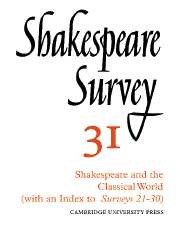Book contents
- Frontmatter
- The Ancient World in Shakespeare: Authenticity or Anachronism? A Retrospect
- ‘A Piece of Skilful Painting’ in Shakespeare’s Lucrece
- Philomel in Titus Andronicus and Cymbeline
- Apuleius and the Bradleian Tragedies
- ‘The Choice of Hercules’ in Antony and Cleopatra
- Structure, Inversion, and Game in Shakespeare’s Classical World
- Truth and utterance in The Winter’s Tale
- Adumbrations of The Tempest in A Midsummer Night’s Dream
- The Old Honor and the New Courtesy: 1 Henry IV
- Henry V: the Chorus and The Audience
- ‘The Devil’s Party’: Virtues and Vices in Measure for Measure
- Shakespeare and the Healing Power of Deceit
- Shakespeare’s Man Descending a Staircase: Sonnets 126 to 154
- A New View of Bankside
- Comedies and Histories at Two Stratfords, 1977
- Tamburlaine the Great Re-discovered
- The Year's Contributions to Shakespearian Study 1 Critical Studies
- 2 Shakespeare’s Life, Times, and Stage
- 3 Textual Studies
- General Index to Surveys 22–30
- Index
- Plate Section
‘The Devil’s Party’: Virtues and Vices in Measure for Measure
Published online by Cambridge University Press: 28 March 2007
- Frontmatter
- The Ancient World in Shakespeare: Authenticity or Anachronism? A Retrospect
- ‘A Piece of Skilful Painting’ in Shakespeare’s Lucrece
- Philomel in Titus Andronicus and Cymbeline
- Apuleius and the Bradleian Tragedies
- ‘The Choice of Hercules’ in Antony and Cleopatra
- Structure, Inversion, and Game in Shakespeare’s Classical World
- Truth and utterance in The Winter’s Tale
- Adumbrations of The Tempest in A Midsummer Night’s Dream
- The Old Honor and the New Courtesy: 1 Henry IV
- Henry V: the Chorus and The Audience
- ‘The Devil’s Party’: Virtues and Vices in Measure for Measure
- Shakespeare and the Healing Power of Deceit
- Shakespeare’s Man Descending a Staircase: Sonnets 126 to 154
- A New View of Bankside
- Comedies and Histories at Two Stratfords, 1977
- Tamburlaine the Great Re-discovered
- The Year's Contributions to Shakespearian Study 1 Critical Studies
- 2 Shakespeare’s Life, Times, and Stage
- 3 Textual Studies
- General Index to Surveys 22–30
- Index
- Plate Section
Summary
Where God hath a temple, the Devil will have a chapel.
(Burton, The Anatomy of Melancholy)Utter my thoughts? Why, say they are vile and false;
As where's that palace whereinto foul things
Sometimes intrude not? Who has that breast so pure
But some uncleanly apprehensions
Keep leets and law-days and in sessions sit
With meditations lawful?
(lago)Writing about ‘the Integrity of Measure for Measure’ (Shakespeare Survey 28 (1975), pp. 89-106), Arthur C. Kirsch severely reprimands Dr Johnson, Coleridge, and numerous modern critics, including myself, for our failure to ‘take the play’s Christian ideas seriously’. We are guilty of a ‘fatal’ misunderstanding of the tragicomedy, because we have been either unable or unwilling to place ourselves ‘in the position of the play’s first audience’. According to Professor Kirsch, we show an absolutely unforgiving and specifically un-Christian refusal to accept the ending and pardon Angelo, whose libidinousness was miraculously transformed by the bed–trick. Indeed, in the course of his essay, Kirsch goes on to conclude that most of the problems which, over the centuries, have vexed so many commentators, can now be ‘explained’. All difficulties will be made comparatively ‘easy’ by an ‘apprehension of certain fundamental Scriptural texts’, and by Kirsch’s own scholarly consideration of how those texts ‘might have been understood and have affected Shakespeare’s contemporary audience’ (quotations are from pp. 89–91). Happily, however, this is simply not true.
- Type
- Chapter
- Information
- Shakespeare Survey , pp. 105 - 114Publisher: Cambridge University PressPrint publication year: 1979
- 1
- Cited by

